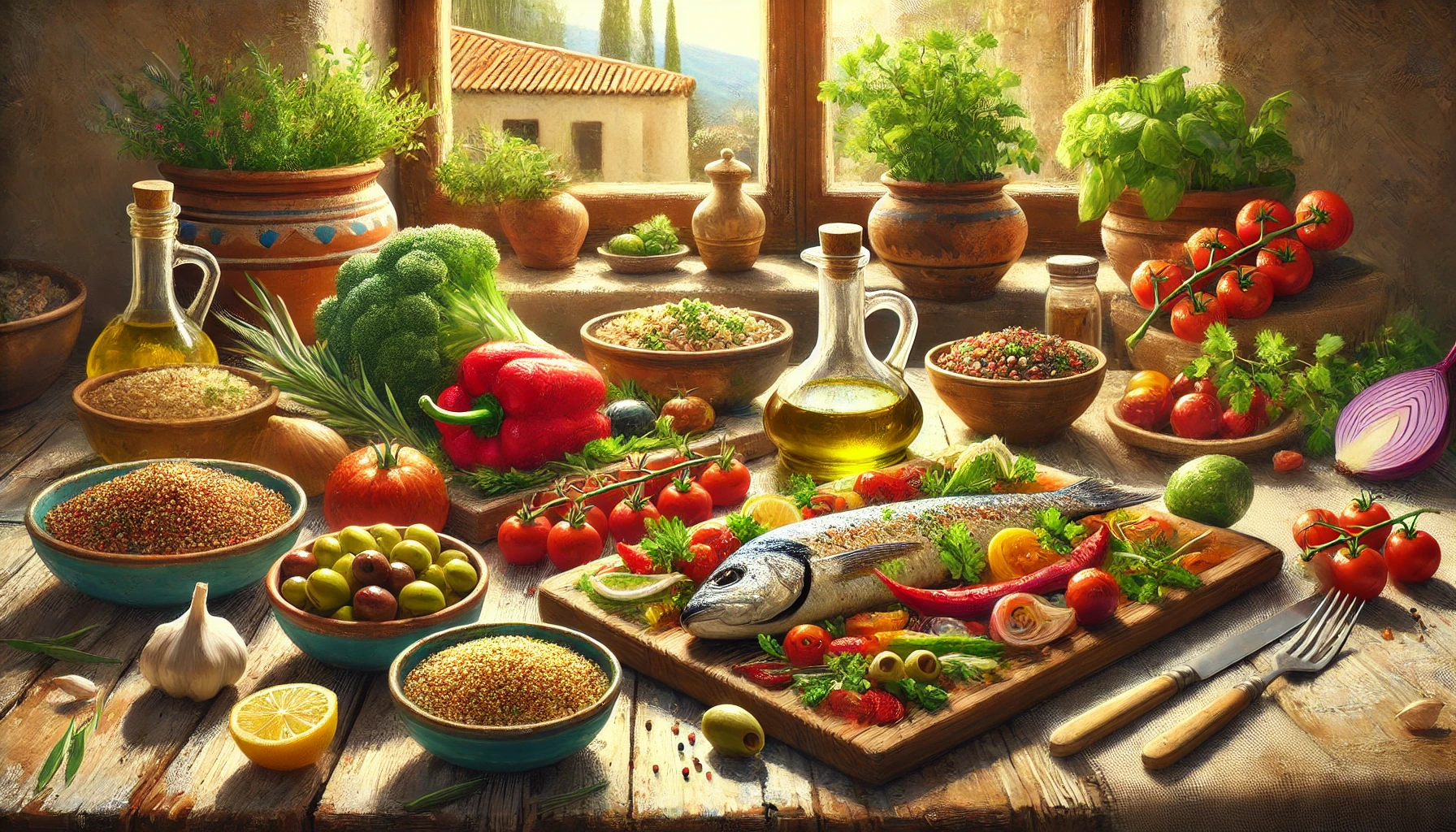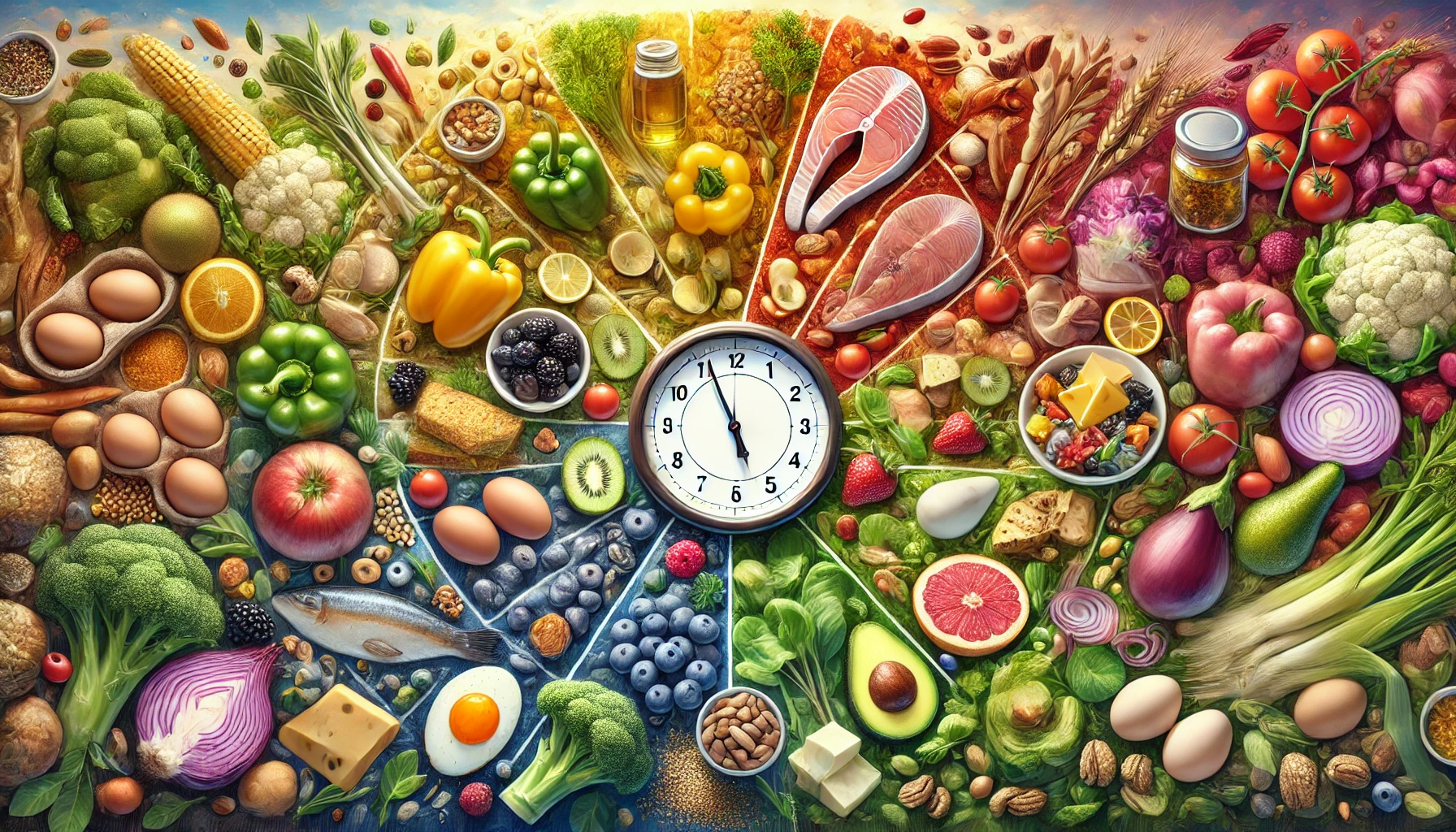Your Journey to Health: How to Start the Mediterranean Diet
If you’re looking to adopt a diet that isn’t just about losing weight but about enhancing your overall health, the Mediterranean Diet might be the perfect choice for you. This way of eating is known for its health benefits, including weight loss, improved heart health, and even enhanced cognitive function. Rooted in the eating habits of people living in the Mediterranean region, it emphasizes fresh, nutrient-dense foods like vegetables, fruits, whole grains, lean proteins, healthy fats, and a little bit of dairy.
The Mediterranean Diet isn’t a quick-fix diet but a sustainable way of eating that promotes balance, mindfulness, and longevity. It’s about enjoying food in moderation, savoring each meal, and celebrating the nourishment it provides. This beginner’s guide to the Mediterranean Diet will walk you through each step to help you get started on the right track. Whether you’re looking to lose weight, improve your heart health, or simply adopt a healthier lifestyle, the Mediterranean Diet offers a simple, enjoyable path forward.
What Is the Mediterranean Diet?
The Mediterranean Diet is inspired by the traditional eating habits of the Mediterranean region, which includes countries such as Italy, Greece, Spain, and southern France. This diet emphasizes whole, fresh, and locally sourced foods that are rich in essential nutrients. What makes this diet stand out is its focus on a variety of foods rather than restricting entire food groups. The Mediterranean Diet doesn’t encourage starvation or cutting out foods you love. Instead, it emphasizes balance, promoting a diet full of healthy fats, whole grains, fresh vegetables, fruits, lean proteins, and moderate amounts of dairy.
It’s not just about the food, though. The Mediterranean Diet is also about the experience of eating—sharing meals with family and friends, enjoying food in a relaxed and mindful way, and making eating an experience that nourishes both your body and soul. With its emphasis on fresh ingredients, healthy fats, and plant-based foods, this diet offers a pathway to heart health, improved brain function, and a reduction in inflammation.
Step 1: Fill Your Plate with Vegetables and Fruits
The foundation of the Mediterranean Diet is plant-based foods, and vegetables and fruits are its cornerstone. These foods are low in calories, high in fiber, and packed with a wealth of vitamins, minerals, antioxidants, and phytochemicals. This not only helps protect your body from free radical damage but also supports immune function, improves digestion, and keeps your energy levels up throughout the day.
When starting the Mediterranean Diet, aim to fill half of your plate with vegetables and fruits at each meal. The more color, the better! Colorful vegetables like spinach, kale, tomatoes, carrots, and bell peppers provide a wide range of nutrients, while fruits such as berries, oranges, apples, and grapes offer natural sweetness and vital vitamins. Including a wide variety of these foods ensures you get a diverse mix of nutrients to nourish your body.
Vegetables like leafy greens, tomatoes, zucchini, and eggplants are commonly used in Mediterranean dishes. These vegetables are rich in antioxidants, which help protect your cells from damage, and they help to lower inflammation in the body. Fruits, on the other hand, add natural sweetness and a refreshing touch to meals. By incorporating more vegetables and fruits into your daily meals, you’ll not only feel fuller but also ensure that your body is receiving the essential nutrients it needs to function optimally.
Step 2: Embrace Healthy Fats, Especially Olive Oil
When it comes to fats in the Mediterranean Diet, the emphasis is placed on healthy fats, particularly extra virgin olive oil. Olive oil is a staple in Mediterranean cuisine, and for good reason—it’s packed with monounsaturated fats that are good for your heart. These fats help lower LDL cholesterol (the “bad” cholesterol) and reduce the risk of cardiovascular disease. Olive oil is also rich in antioxidants, which protect your body from oxidative stress and inflammation.
Starting with olive oil is easy and beneficial. Swap out your usual cooking oils or butter for extra virgin olive oil when making your meals. You can drizzle it over salads, roasted vegetables, or use it as a dip for whole-grain bread. The flavor is rich and delicious, and it provides health benefits that go beyond just making food taste better. Olive oil is a healthy fat that promotes satiety, which means it helps keep you feeling full for longer, reducing cravings and promoting better weight management.
Besides olive oil, other healthy fats such as nuts, seeds, and avocados are also encouraged. These fats provide omega-3 fatty acids, which are essential for reducing inflammation and improving brain function. Incorporating a variety of healthy fats into your diet will support your heart health, regulate blood sugar, and even improve your skin and hair.
Step 3: Make Whole Grains Your Carbohydrate of Choice
Unlike many other diets that restrict carbohydrates, the Mediterranean Diet encourages whole grains, which are a great source of energy, fiber, and important nutrients. Whole grains, unlike refined grains, contain all parts of the grain—the bran, germ, and endosperm—providing you with fiber, protein, vitamins, and minerals. Whole grains help stabilize blood sugar levels, maintain digestive health, and provide you with long-lasting energy.
To get started, swap out refined grains like white rice, white pasta, and white bread for whole grains such as quinoa, barley, brown rice, oats, and whole wheat. Whole grains are not only more nutritious, but they are also more filling. By incorporating these into your meals, you’ll feel fuller for longer, preventing overeating and promoting healthy weight loss.
Whole grains can be used in a variety of Mediterranean dishes, from grain-based salads to soups and stews. You can make hearty barley salads, quinoa bowls, or stir-fried vegetables with brown rice for a filling, nutritious meal. The versatility of whole grains makes it easy to incorporate them into any meal, and their complex carbohydrates provide sustained energy throughout the day.
Step 4: Choose Lean Proteins, Especially Fish and Seafood
Protein is an important part of any diet, and the Mediterranean Diet emphasizes lean, healthy sources of protein. The diet’s primary protein sources come from fish and seafood. Fatty fish, such as salmon, sardines, and mackerel, are rich in omega-3 fatty acids, which are crucial for reducing inflammation, improving heart health, and supporting brain function.
The Mediterranean Diet encourages eating fish at least twice a week, and it is a great way to get a healthy dose of protein without the saturated fats found in red meat. Fish also provides high-quality protein that supports muscle health, promotes healthy aging, and aids in recovery after exercise. Seafood such as shrimp and mussels can also be included for a variety of tastes and textures.
While fish is the primary animal protein source, the Mediterranean Diet also includes moderate amounts of poultry, eggs, and plant-based proteins like beans, lentils, and chickpeas. These plant-based protein sources are high in fiber and essential nutrients, making them an excellent choice for vegetarians or those who want to reduce their meat intake.
Step 5: Incorporate Dairy in Moderation
Dairy products are included in the Mediterranean Diet, but they are consumed in moderation. The focus is on high-quality, minimally processed dairy products like Greek yogurt and cheese. Greek yogurt, in particular, is valued for its high protein content, probiotics, and calcium, which are beneficial for digestive health, bone health, and muscle function.
While dairy is part of the Mediterranean Diet, it’s not the centerpiece of every meal. Opt for low-fat or fat-free dairy when possible, or choose plant-based alternatives like almond milk, coconut yogurt, or soy milk. These alternatives are often fortified with calcium and vitamin D, ensuring you still get the nutrients you need without the extra saturated fats from full-fat dairy products.
Step 6: Stay Hydrated with Water and Herbal Teas
Water is the beverage of choice in the Mediterranean Diet. Staying hydrated is key to overall health, and drinking plenty of water throughout the day helps maintain hydration levels, supports digestion, and boosts energy. Aim for at least eight glasses of water per day, or more if you’re physically active.
In addition to water, herbal teas such as chamomile, mint, and green tea are also popular in Mediterranean cultures. Green tea, in particular, is rich in antioxidants that have been linked to improved metabolism and fat loss. Avoid sugary sodas and sweetened drinks, which add empty calories to your diet without offering any nutritional benefits.
Step 7: Enjoy Meals with Family and Friends
One of the most enjoyable aspects of the Mediterranean Diet is the emphasis on social eating. Meals are not just about fueling your body—they’re about spending time with loved ones, enjoying each other’s company, and savoring the flavors of the food. People in Mediterranean cultures often take time to enjoy long, leisurely meals with family and friends, and this approach to eating can help reduce stress, improve digestion, and make mealtime an enjoyable experience.
As you start the Mediterranean Diet, make time for family meals, cook together, and share stories over a delicious spread of fresh ingredients. This practice not only nourishes your body but also supports emotional well-being, making it easier to form a healthy, balanced relationship with food.
Your Mediterranean Diet Adventure Begins Here
Starting the Mediterranean Diet is an exciting, fulfilling journey that promotes long-term health, weight loss, and happiness. By incorporating more plant-based foods, healthy fats, whole grains, lean proteins, and dairy in moderation, you’ll enjoy meals that are as nourishing as they are delicious. With the Mediterranean Diet, you’re not just adopting a diet—you’re embracing a new way of life that celebrates balance, flavor, and mindfulness.
So why wait? Begin your Mediterranean Diet adventure today, and embrace a lifestyle that helps you feel your best, inside and out. It’s not about restriction—it’s about nourishing your body with foods that will support you for years to come.




